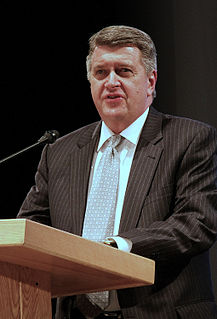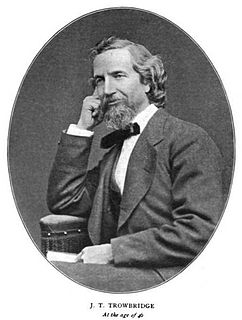A Quote by Democritus
Our sins are more easily remembered than our good deeds.
Quote Topics
Related Quotes
Like Muslims we assume that God will judge us "on balance." If our good deeds outweigh our bad deeds, we will arrive safely in heaven. But, alas, if our evil deeds outweigh our good ones, we will suffer the wrath of God in hell. We may be "marred" by sin but in no wise devastated by it. We still have the ability to balance our sins with our own righteousness. This is the most monstrous lie of all.
It is hard living down the tempers we are born with. We all begin well, for in our youth there is nothing we are more intolerant of than our own sins writ large in others and we fight them fiercely in ourselves; but we grow old and we see that these our sins are of all sins the really harmless ones to own, nay that they give a charm to any character, and so our struggle with them dies away.
Behold how all those people are merchants who shun great sins and would like to be good and do good deeds in God's honour, such as fasts, vigils, prayers, and similar good deeds of all kinds. They do all these things so that our Lord may give them something, or so that God may do something dear to them. All these people are merchants.
The gospel of Jesus Christ encompasses much more than avoiding, overcoming, and being cleansed from sin and the bad influences in our lives; it also essentially entails doing good, being good, and becoming better. Repenting of our sins and seeking forgiveness are spiritually necessary, and we must always do so.
Apologizing for our past sins may reveal character and for a time lessen anti-Americanism abroad, but if it is done without acknowledging that the sins of America are the sins of mankind, and that our remedies are so often exceptional, then it only earns transitory applause—and a more lasting contempt that we ourselves do not believe in the values we profess.
We must remember that much spiritual growth does not occur suddenly but rather through time and experience. The encouraging message of the gospel is that God does not often require us to perform sensational or extraordinary deeds but rather to try to do better today than we did yesterday. He is mindful of our desires, our determination, and our direction as well as of our deeds.
Christ is a most precious commodity, he is better than rubies or the most costly pearls; and we must part with our old gold, with our shining gold, our old sins, our most shining sins, or we must perish forever. Christ is to be sought and bought with any pains, at any price; we can not buy this gold too dear. He is a jewel more worth than a thousand worlds, as all know who have him. Get him, and get all; miss him and miss all.









































